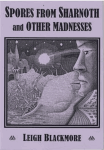Spores from Sharnoth and Other Madnesses
Leigh Blackmore
P’rea Press
Trade Paper, 56 pages, $15.00 AU
Review by Sheila M. Merritt
There’s a different holiday perspective in the land down under. It’s the yin to our yang; very antipodean, indeed. In the poem “Terror Australis,” a play on the phrase Terra Australis, Leigh Blackmore reminds:
The Southern Land–where snow but rarely falls–
In Yuletide brings the threat of searing fire;
Where sun and heat with sweat and dust conspire–
No holly and no ivy deck the halls.
Given this geographical discrepancy; a widdershins cerebral challenge, it would appear that never the twain shall meet between the two cultures. Yet, in his evocative embracing of American horror authors H.P. Lovecraft and Clark Ashton Smith, poet Blackmore shows that writers’ influences know no boundaries. Lands may separate, but literature unites. Spores from Sharnoth and Other Madnesses, is a collection of poems that illustrate reverence for the works of two terror-meisters. The appreciation of their gifts is uniquely expressed in the eloquent words, and choice phrasing of Leigh Blackmore.
His homage to Lovecraft’s story “Pickman’s Model,” becomes plural in the poem “Pickman’s Models.” Here is its second stanza:
Madness and talent, both in him are rife;
His brush a nightmare-spawning wand, Hell’s fires
In pigment he sets down–yet never tires;
For Pickman paints his dreadful works from life…
Beneath the streets of Boston, loathsome beasts
Live over-nourished on appalling feasts!
The tortured artist, a motif that reflects the work and life of Edgar Allan Poe, inspired Lovecraft’s short story. Blackmore seizes on the febrile force inherent in the tale, and distills it with poetic preciseness and passion.
Clark Ashton Smith is honored in the thrum and cadence of “Memoria: A Fragment From the Book of Wyvern.” In part III, the opening passage encapsulates the overall atmosphere of the piece:
Now I am there once more at fall of night,
And as I gaze upon remembered things–
The blasting-wand and brazier, deviced
With lions winged and serpents venom-fanged–
Music by Winter’s frosty wind-glance blown
Beats airy fists on mirror panes nearby
And I peer out to see the sunless globes
Of thick, dark night give way to clear, cold skies.
This narrative poem elicits mental images comparable to those in Smith’s poetry. The writing has a fever dream quality in its drug infused theme and structure; a pervasive hypnotic, hallucinatory tone. Tinged with an unholy sensuality, the length and languid pacing enhance the mood.
Smith’s influence is also evident in “Succubus,” a visually vivid poem which contains this most memorable first stanza:
Dead moons slumber in your eyes;
Pale and leprous is your face;
Parchment-like your withered thighs
That grip me in their dry embrace.
The startling imagery gets increasingly graphically gripping in the third and final stanza, escalating to a crescendo that is vastly disturbing and powerful.
Spores from Sharnoth and Other Madnesses displays Blackmore’s deft way with words to fine advantage. Yet, there is more than mere verbal dexterity astir here. Within the shadows and shadings of form and content, there is a heart; a depth of feeling. H.P. Lovecraft and Clark Ashton Smith knew that engaging the cerebral is rewarding, but enthralling the emotions of the reader is the goal. Leigh Blackmore follows their lead.









